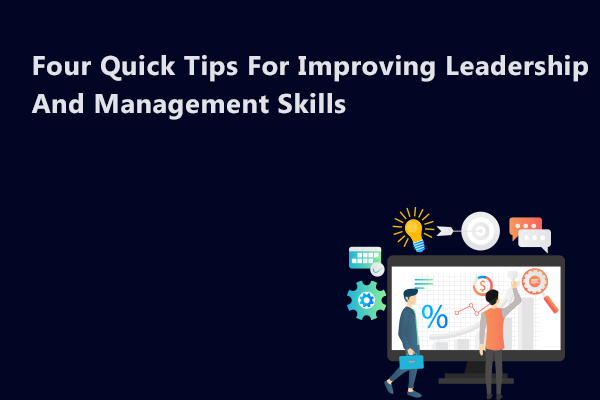
Four Quick Tips For Improving Leadership And Management Skills
Leadership and Management are two distinct yet interconnected terms that play a crucial role in the success of any organization. While both involve guiding and directing individuals toward a common goal, they differ in their approach and focus. Whether you are a seasoned leader or just starting your management journey, there is always room for improvement. Leadership is all about inspiring and motivating people to achieve a shared vision, while management focuses on planning, organizing, and controlling resources to meet specific objectives.
With the right mindset and approach, you can enhance your leadership skills to become more effective in your role. In this article, we will delve deeper into the concepts of Leadership And Management, and how they work together to achieve organizational success. We'll also share four quick tips that can help you improve your leadership skills and achieve your goals.
The Four Quick Tips To Improve Leadership And Management Skills
Now let’s go through the four quick tips that can help you become a more effective leader and manager:
Tip #1 - Define Your Goals and Objectives
Defining clear goals and objectives is an essential first step in improving your leadership skills. By setting specific, measurable, achievable, relevant, and time-bound (SMART) goals, you can create a clear roadmap for success and stay focused on your priorities. Defining your goals and objectives also enables you to communicate your expectations to your team and align everyone's efforts toward a common purpose.
Whether you are leading a project, a team, or an entire organization, having clear goals and objectives can help you make informed decisions, prioritize your tasks, and track your progress toward achieving your desired outcomes. This promotes effective Leadership Development within the team and organization at large.
Tip #2 - Develop Communication Skills
Effective communication is a fundamental skill that every leader and manager should possess. It is essential for building relationships, conveying ideas, providing feedback, and resolving conflicts. Developing strong communication skills involves not only speaking clearly and concisely but also listening actively and empathetically.
It requires being aware of your audience's needs, preferences, and communication styles and adapting your approach accordingly. Effective communication also involves choosing the right medium for the message, whether it be face-to-face conversations, emails, video calls, or written reports. By developing your communication skills, you can foster a culture of open communication, build trust with your team, and ensure that everyone is on the same page. This encourages better Leadership Development within teams.
Tip #3 - Establish a Positive Work Environment
Establishing a positive work environment is essential for any business to succeed. It encourages employee engagement and motivation, which leads to higher productivity and better team-building activities. A positive work environment also helps to build trust between employees and employers, which can lead to better communication and collaboration.
By creating an atmosphere where employees feel valued, appreciated, and respected, businesses can foster a culture of success. Implementing strategies such as team-building activities, recognition programs, and flexible work arrangements are all great ways to create a positive work environment.
Additionally, leaders who are approachable, supportive, and lead by example can inspire and motivate their employees to perform at their best. They can also create a sense of purpose and direction by setting clear goals and expectations, providing constructive feedback, and recognizing and rewarding employees' achievements. By promoting open communication, collaboration, and trust, and investing in Leadership Training for employee development, leaders can create a positive work environment where employees feel empowered to contribute to the organization's success.
Tip #4 - Cultivate a Growth Mindset
A growth mindset is a belief that one's abilities and intelligence can be developed through hard work, dedication, and persistence. Here are some ways to cultivate a growth mindset:
- Embrace challenges:
Instead of avoiding challenges, approach them with a positive attitude and view them as opportunities for growth and learning.
- Learn from failure:
Understand that failure is a natural part of the learning process, and use it as an opportunity to reflect, learn, and grow.
- Seek feedback:
Embrace feedback and view it as an opportunity to learn and improve. Actively seek out feedback from colleagues, mentors, and team members.
- Develop new skills:
Continuously learn and develop new skills through Leadership Training, workshops, and courses. This will help you stay relevant and adapt to changing circumstances.
- Encourage growth in others:
Cultivate a growth mindset in your team by encouraging them to embrace challenges, learn from failure, and develop new skills.
By cultivating a growth mindset, you can develop the skills and qualities necessary to become a successful leader and manager. With dedication, persistence, and a positive attitude toward challenges and learning, you can continuously improve your leadership skills and achieve your goals.
Final Words
Improving your leadership skills requires a continuous effort to learn, grow, and cultivate a growth mindset. By implementing the tips outlined in this article, you can develop the skills and qualities necessary to become an effective leader and manager. Remember to embrace challenges, learn from failure, seek feedback, develop new skills, and encourage growth in others. With these practices in mind, you will be well on your way to achieving success in your Leadership and Management roles. Good luck!
